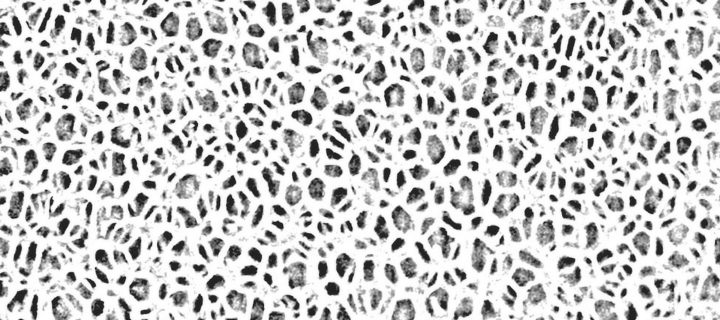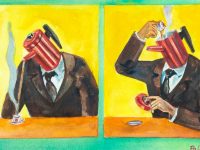In the summer of 2018 a middle-aged Danish woman, Inga Wilson, married to an English tattoo artist, moved into a house on the outskirts of Tintagel with her husband and three teenage children. In the attic she found an old journal, and in the following years she wrote in it as her children grew up, got married and moved away.
The journal was written as preparation for The Quota (2018). This is just one version of the content. There is another one, which follows her through the years as the country breaks apart, fascism shows it ugly head and she ends up in a detention center, utterly broken and alone. Both stories are part of her journal. Both experiences can be read from her journal. But why is this interesting?
When you write by hand, you remember. Research has shown (Mueller & Oppenheimer 2014), that the best way to remember the substance of a lecture is writing notes by hand. Handwriting is a medium between the body and the mind. It is a physical manifestation of your thoughts. When you write as the character you are going to play in a larp, you remember — not just the background and story of the character provided to by the organizers, but the mind of the character as you want it to be, with the knowledge and quirks characterizing this person. You start to know the character, not just in your mind but also in your body. You learn.
On receiving your character, you start the arduous work of creating a persona that is both you and not you. You choose your costume, the props you want to use during the larp, contact your relations — and if you have the time, you start to write. You must now choose the form your writing is going to take. Is it going to be a journal, a diary, an essay or maybe letters to your contacts? And you must choose your tools according to the setting of the larp. If you are a noblewoman around 1800 you may want to use pen and ink. And if you are Granny Weatherwax, you will probably go to the nearest farm and grab a tailfeather from the rooster[1]Do not try geese — much too angry.. This is not a reenactment, nobody will comment on what you use or how you use it, but your choice will be part of how you build your character. So will the paper you are using and the handwriting skills of your character. Handwriting is a very tactile medium. You feel how the pen moves over the paper as you start writing. You may find out that your choice of pen and paper will impact your calligraphy.
Now you must decide what you will be writing. When will your journal start? Is it an old diary, started a long time ago? Are you writing to friends or foes? Is it private or public? This will be the start of a long list of choices you have to make on behalf of your character as you start writing. It will start dawning on you that there are things missing in your character sheet essential to your writing and your story. You start to look up clues, to find the missing links to your character on the internet or in books and journals. As you start exploring, your character will start to awaken.
Now you and your character are ready to start the larp. Your writing will become part of your play, a way to pick up clues and relations, or to take a break in a space of your own if you need to. You can write your deepest secrets or comment on the shenanigans going on around you in your journal, diary or letters and leave it to be read by others or keep it private. How, when, where and if you use it is up to you and your character in the larp. Writing is not a goal but a tool to immerse yourself in the larp and maybe recognize patterns and relations that you might otherwise have overlooked.
After the larp you may want to write your last entries. This could be the next day or maybe later. But always say goodbye to your character — if possible, in handwriting. Just as the character is created using your body and mind, you send it away.
Bibliography
Pam A. Mueller and Daniel M. Oppenheimer (2014): The Pen is Mightier Than the Keyboard: Advantages of Longhand Over Laptop Note Taking. Psychological Science, vol. 25, no. 6.
References
| ↑1 | Do not try geese — much too angry. |
|---|






